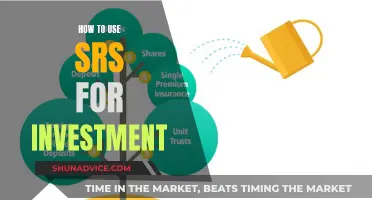
Investing your money is always a risk, but there are some options that are safer than others. If you're looking to put your cash somewhere relatively safe, you might want to consider a high-yield savings account, money market funds, treasury bills, notes and bonds, or certificates of deposit (CDs). All of these options are considered low-risk, but they also have lower returns than riskier investments. They're a good choice if you're looking to preserve your capital and maintain a steady flow of interest income. However, it's important to keep in mind that low-risk investments may not keep up with inflation, so you could lose purchasing power over time.
| Characteristics | Values |
|---|---|
| Returns | Low-risk investments tend to provide modest returns. |
| Liquidity | Safe investments are liquid enough to convert to cash when needed. |
| Risk | All investments carry some degree of risk. |
| Inflation | Inflation can erode the value of low-risk investments over time. |
| Diversification | Safe investments are a smart source of diversification for a portfolio. |
| Volatility | Safe investments are stable and less prone to market volatility. |
| Accessibility | Safe investments are easily accessible and can be purchased online. |
| Insurance | FDIC insurance guarantees deposits of up to $250,000 per institution per investor. |
| Interest Rates | Interest rates vary based on the term and amount deposited. |
| Taxes | Interest earned on investments may be subject to taxes. |
What You'll Learn

High-yield savings accounts
- Annual Percentage Yield (APY): High-yield savings accounts typically offer APYs that are much higher than traditional savings accounts, often around 4-5% or even higher. This means your savings will grow faster over time.
- No Monthly Fees: Many high-yield savings accounts have no monthly service fees, so you can keep more of your money.
- Easy Access: High-yield savings accounts usually offer easy access to your money through online banking, mobile apps, and ATMs. However, some accounts may limit the number of withdrawals you can make per month.
- Variable Rates: It's important to note that high-yield savings accounts typically have variable rates, which means the interest rate can change over time.
- Minimum Balance Requirements: Some high-yield savings accounts have minimum balance requirements to earn the highest APY. Be sure to check the requirements before opening an account.
- FDIC or NCUA Insurance: High-yield savings accounts at banks are federally insured by the Federal Deposit Insurance Corporation (FDIC), while credit union accounts are insured by the National Credit Union Administration (NCUA). This means your money is safe and protected up to $250,000.
- LendingClub Bank: 5.00% APY, no minimum opening deposit, no monthly service fees.
- BrioDirect: 5.00% APY, $5,000 minimum opening deposit, $5 monthly paper statement fee.
- EverBank: 4.75% APY, no minimum opening deposit, no monthly maintenance fee.
- Bread Savings: 4.75% APY, $100 minimum opening deposit, no monthly maintenance fee.
- CIT Bank: 4.70% APY, $100 minimum opening deposit, no monthly service fee.
- Bask Bank: 4.65% APY, no minimum opening deposit, no monthly service fee.
- Popular Direct: 4.65% APY, $100 minimum opening deposit, $25 early account closure fee within the first 180 days.
When choosing a high-yield savings account, it's important to consider the APY, minimum balance requirements, monthly fees, and ease of access to your money. Be sure to shop around and compare different options before opening an account.
Cash Investments: What Are They?
You may want to see also

Money market funds
There are several types of money market funds, including:
- Government money market funds: These funds invest in government securities, such as U.S. Treasuries, and collateralized repos involving Treasuries.
- Municipal money market funds: These funds invest in municipal securities and are often called tax-exempt funds because the interest on these securities is generally exempt from federal income tax.
- Prime money market funds: These funds can invest in a variety of securities, including government, bank, corporate, and other non-government securities.
- U.S. Treasuries: Interest-paying debt securities issued by the U.S. government.
- Municipal securities: Interest-paying securities issued by municipal and state governments to finance various operations.
- Certificates of deposit (CDs): A promissory note issued by a bank that agrees to pay a fixed amount of interest in exchange for depositing cash for a specified time period.
- Commercial paper: Short-term debt issued by companies to pay liabilities that need to be met immediately.
- Repurchase agreements (repos): A short-term debt agreement in which a dealer sells government securities to an investor as collateral in exchange for cash and agrees to repurchase them at a later date.
- Bankers' acceptances: A promised future payment issued and guaranteed by a bank.
Extra Cash: Smart Investment Strategies for Beginners
You may want to see also

Short-term certificates of deposit
CDs are available at most banks and credit unions and can be opened similarly to a standard bank deposit account. When shopping for a CD, consider the interest rate, term, principal, and financial institution. The interest rate is usually fixed, but there are variable-rate CDs that could earn a higher return if rates rise. The term is the length of time that you agree to leave your funds deposited, and the longer the term, the higher the interest rate tends to be. The principal is the amount you agree to deposit when you open the CD, with a minimum deposit typically required. The financial institution, such as a bank or credit union, will set factors such as early withdrawal penalties and whether the CD will automatically reinvest at maturity.
CDs offer several benefits, including fixed and guaranteed interest rates, federal insurance of up to $250,000, and higher interest rates than savings and money market accounts. They are also a safer and more conservative investment than stocks and bonds. However, there are a few drawbacks to consider. CDs have less growth opportunity than stocks and bonds, and if you withdraw your funds early, you will be charged a penalty. Additionally, if you lock into a fixed-rate CD and interest rates rise during the term, you could miss out on higher returns.
To find the best rates for short-term CDs, it is recommended to shop around online and compare what different banks offer. With interest rates rising, it may be wise to opt for short-term CDs and then reinvest if rates increase. You can also consider a no-penalty CD, which allows you to withdraw your money early without incurring a penalty.
Understanding Cash Flow: Investing Activities Explained
You may want to see also

Treasury bills, notes, bonds and TIPS
Treasury bills, notes, bonds, and TIPS are U.S. government debt securities that differ in duration, the interest they pay, and the amount of interest rate risk they carry. They are considered low-risk investments because they are issued and backed by the U.S. government. They are also budget-friendly, as they can be purchased in $100 increments, and they are exempt from state and local taxes. However, you still pay federal taxes on the interest earned.
Treasury bills, or T-bills, mature in one year or less and are sold at a discount to their face value. Your return is the difference between the face value and the discounted price you initially paid. They are considered highly liquid and are often used for short-term cash management or as a near-cash holding in a portfolio.
Treasury notes, or T-notes, have maturities ranging from two to ten years. They pay interest every six months and usually offer lower yields than T-bonds. Like T-bonds, the yield is determined at auction, and upon maturity, you get the face value of the note.
Treasury bonds, or T-bonds, have the longest maturity, at 20 or 30 years. They pay the highest coupons or interest, paid twice yearly. They usually offer the highest interest rates because investors want more money to put aside for the long term.
Treasury Inflation-Protected Securities (TIPS) are government bonds that protect your money from the ravages of inflation. The value of your principal rises or falls over the term of the security, depending on the current rate of CPI inflation. The interest rate on each security is fixed, but since the principal fluctuates, your interest payments also rise and fall. At maturity, if the principal is higher than your original investment, you keep the increased amount. If it is equal to or lower, you get the original amount back.
Understanding E-Trade Cash Calls: What Investors Need to Know
You may want to see also

Dividend-paying stocks
Dividend yield, or the percentage of a business's profits paid to shareholders in cash, is an important factor to consider when investing in dividend-paying stocks. A high dividend yield may not always be a good sign, as it could indicate that the company is returning too much of its profits to investors rather than reinvesting in its growth. The dividend payout ratio, which measures the percentage of profits paid out to shareholders, is a key metric to watch. A payout ratio above 80% generally indicates that the company is putting a large percentage of its income into paying dividends.
When assembling a dividend stock portfolio, it is important to avoid common pitfalls such as sector concentration and liquidity traps. Diversification across sectors and countries is crucial, as is ensuring that only a portion of the portfolio relies on companies that continually issue new shares to fund growth. Additionally, investors should consider the dividend growth rate, dividend payout ratio, financial flexibility, organic growth, and the company's balance sheet when evaluating dividend-paying stocks.
Cash App Investment Options: Where to Put Your Money
You may want to see also
Frequently asked questions
Safe investments tend to provide modest returns. Safer investment options like online savings accounts and certificates of deposit are currently paying significantly more than they have in the past. However, their yields are still lower than riskier investments.
Money market accounts, online high-yield savings accounts, cash management accounts, and certificates of deposit (CDs) are FDIC-insured. Treasury notes, bills, and bonds are backed by the U.S. government.
Pros: Easy to open, insured by the FDIC, easy access to money, ideal for emergency savings.
Cons: Low interest may not keep up with inflation, rates are not fixed, taxes are due on interest earned.
Pros: Insured up to $250,000 per issuer, higher interest rates, variety of terms including no-penalty CDs.
Cons: Withdrawal penalties, need to move fast to secure the best rates, CDs can be "called in" early.







